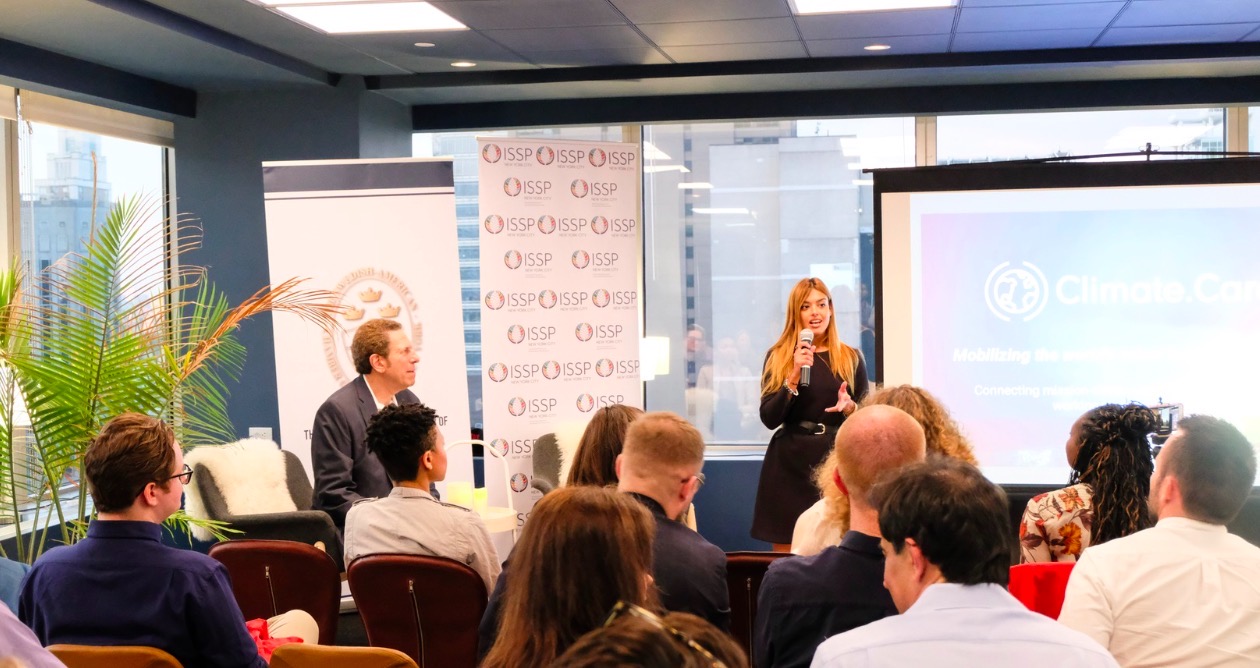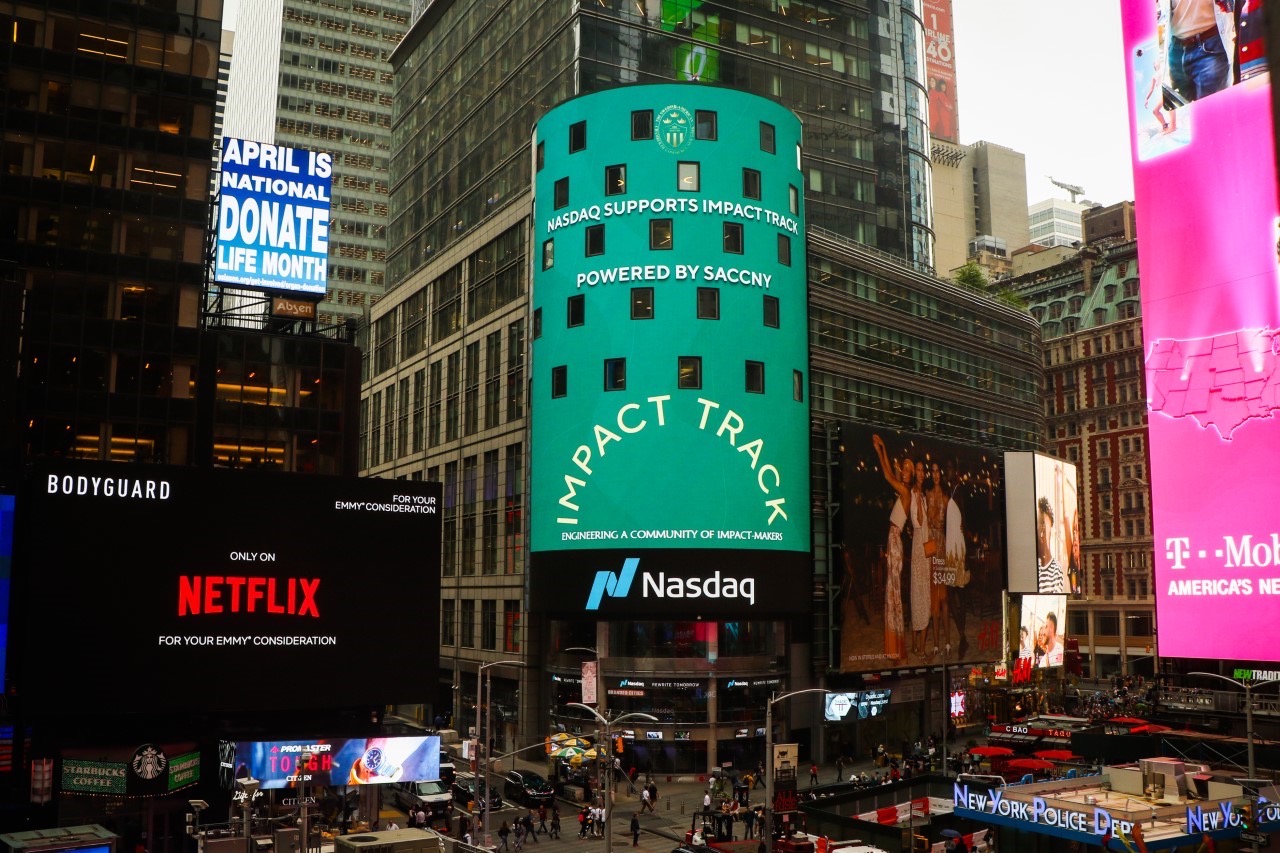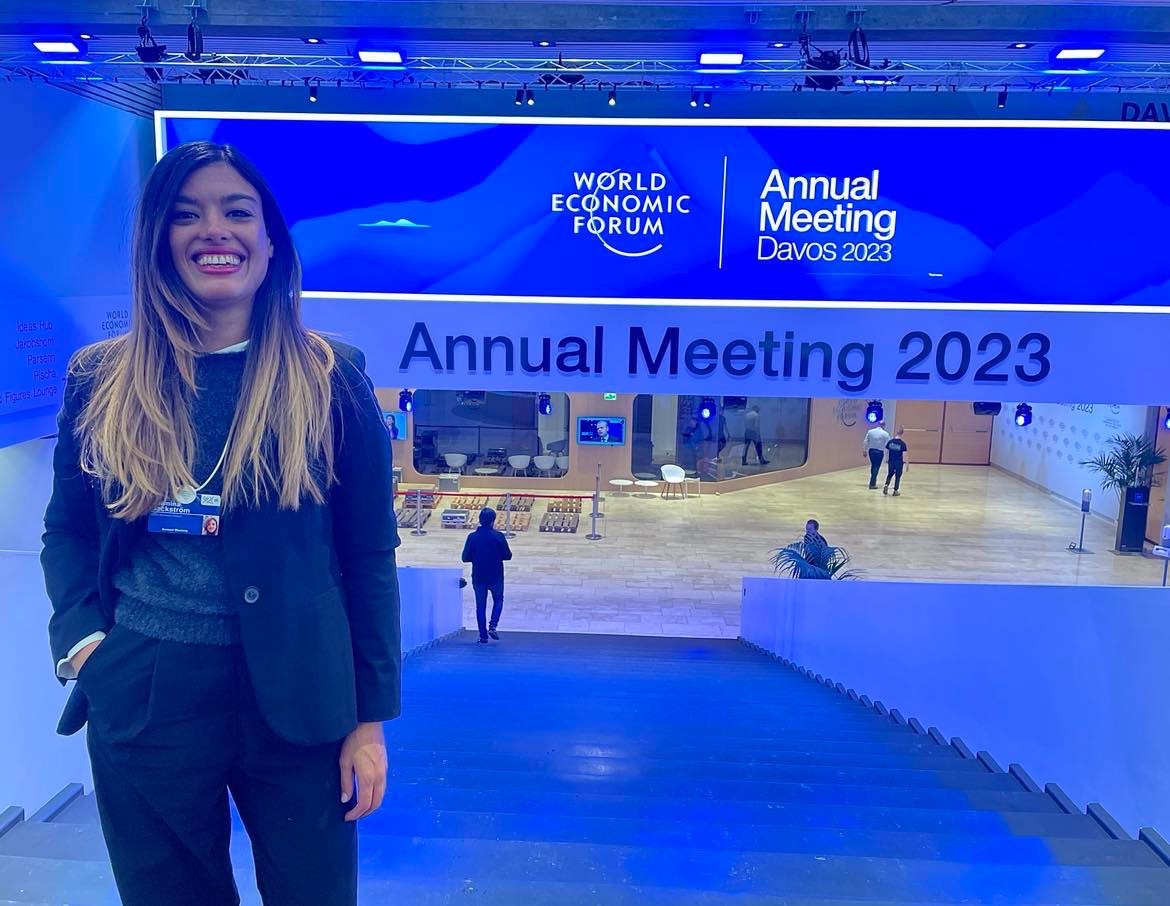Yasmina Backström’s story is a transcontinental tale of ambition and innovation. With roots in both Sweden and the United States, she has a unique perspective on the intersection of Scandinavian entrepreneurship and American corporate culture.
Following her studies at the University of Sorbonne in Paris, she made her way back to the Big Apple, where she would help bridge the gap between Swedish startups and American investors at the Swedish-American Chamber of Commerce in New York, where I first met her. Since then I have been following her journey with great curiosity, inspired by her unwavering commitment to Swedish values through our appreciation for sustainability, combined with a fierce grit and determination emblematic of New York.
Today, Yasmina is a part of the World Economic Forum’s Digital Transformation initiative, where she focuses on leveraging digital innovation to promote sustainability.
I had the opportunity to interview Yasmina and delve into her insights on the intersection of Scandinavian and American corporate culture, as well as a topic that has been one of the greatest focal points of the decade – our environment and the pursuit of a sustainable future.
Interview by Natalie Söderberg, Founder & Editor at Swedes in the States.
From Stockholm to New York via Paris, what brought you to the U.S., and why did you decide to leave Sweden?
Though Stockholm is home, New York is equally as much so. I was born in New York and spent the first years of my life here. I spent a lot of time between Stockholm and New York growing up, as I had one parent in each city. After finishing my studies in Paris, I decided to move back to where I was born and have been living here for seven years now. It wasn’t so much leaving Sweden as moving to New York and closer to opportunities and family on this side of the world.
Getting the best of both worlds, has your Swedish background worked to your advantage in the U.S.?
Definitely yes, I think Swedes have a reputation (especially in the US) for being ambitious, innovative, and creative thinkers. Working closely with Swedish-American business communities for years through the Swedish-American Chamber of Commerce, and experiencing the differences first-hand, I always heard that Swedes bring a lot of motivation and curiosity to the table. Swedish business culture is more open, and less hierarchical than American business culture, and I think that mindset is an advantage here in the US.
What was your role at the Swedish-American Chamber of Commerce in New York, and how does the organization work to benefit the Swedish business community in New York?
I worked for the Chamber of Commerce for five years and joined at a very transformative time for the organization and also for the Swedish-American business landscape as a whole.
Sweden started gaining a lot of attention as being a “Unicorn factory” on par with Silicon Valley, and innovation from the Nordics was gaining a lot of traction from American investors and businesses in our network. My role was to be an ambassador for the influx of Swedish innovation coming into the United States and to help shape platforms for ambitious startups to do business on this side of the Atlantic. The more I worked with these entrepreneurs, the more I realized that most of them have an incredibly strong do-good ethos and a sustainability mindset woven into their DNA.
We established a physical innovation hub in Midtown Manhattan called Gateway for entrepreneurs to scale their businesses in the American market and share experiences with each other. As we started to notice a growing number of entrepreneurs working in the sustainability space, we also launched the Swedish-American Impact Track, a platform dedicated to impact-focused entrepreneurs and businesses in clean-tech, food-tech, and social innovation.
Promoting Swedish innovation through these initiatives and making the necessary connections for them to grow their ideas in a new market was, in my opinion, the greatest part of what we achieved at SACC New York.
Scandinavian corporate culture has had a rise in popularity, much thanks to Swedish giants such as Spotify. How do you think American companies could benefit from learning from Swedish corporate practices? Similarly, what aspects of the American corporate culture or work ethic could Scandinavians benefit from adopting?
Working in the U.S. is without a doubt great for your career, the building blocks you get toward the next phases of your career here are unparalleled.
Networking skills here are key and building a strong network around you is essential – for better or for worse. Relationship building and going outside of your comfort zone to meet people, asking them for what you need and reciprocating is something I think Sweden can learn from the U.S.
In terms of how the systems work in the U.S. compared to Sweden, things are very different. The social system is much more fragile here. People don’t benefit from the same security as our Nordic counterparts so when times are tough, like the past couple of years, many feel unsafe. The safety net many are provided by their employers or the government could be very limited.
In Sweden, on the other hand, the business culture, and support system, all in all, is more human-centric. Your personal life is equally as important as work, and this is reflected in the policies. It makes it easier to balance what is most important in life, like 16-month long parental leave when starting a family, five or more weeks of paid vacation to get a break from work, or being able to take mental health sick leave in case of burnout.
This safety net, in my opinion, provides a level of security that allows people to balance work and life in a way that is much less possible in the U.S. – or at least in New York City. Although many American companies are changing their policies to attract and retain talent, it still doesn’t offer the same level of security as in Sweden.


What does day-to-day at the World Economic Forum look like for you?
I work with the World Economic Forum’s Digital Transformation initiative, focusing on digital innovation and business models that can accelerate sustainability efforts. We currently are working together with our executive business communities to leverage digital tech and data to scale climate action in high-emission industries
Many businesses and governments have pledged to dramatically reduce emissions this decade and have made commitments to become “Net Zero” by 2050.
So far, businesses have not been able to deliver on these commitments and many industries need to be rewired to do so. Digital technologies like AI, IoT, and Digital Twin are powerful accelerators when it comes to reducing emissions and can help companies deliver on their commitments.
Scandinavia is often hailed as being one of the most sustainable regions in the world. What specific sustainability practices or policies employed by Scandinavian countries could be implemented in the United States to help promote a more sustainable future on both a micro and macro level?
Sweden definitely has a strong culture of environmental awareness, which has led to an understanding and appreciation of the importance of sustainability. This cultural mindset can be seen across government policies, business practices, and individual behavior, all of which prioritize sustainable practices.
Sweden also invests heavily in renewable energy, public transportation, and sophisticated, no-excuse recycling systems. Media coverage about climate change and how we each can individually play a role in it is also more prevalent in Sweden than in the U.S.
That said, the U.S. is a much larger and more populous country, and attitudes and sustainability practices vary among the states. Some states, cities, and a growing number of businesses are at the very cutting edge of sustainability innovation and many American impact unicorns are demonstrating systems change at a scale that in many ways leads the way.

What drives and inspires you in your career?
I am inspired by everything that is happening in the sustainability space today. We have a long road ahead before we can truly call ourselves fully sustainable, but businesses are taking the lead and shifting the way they operate to make sure we have a liveable planet tomorrow.
Together with governments and innovators, our environmental crisis can be overcome and meaningful progress toward our shared goals can be made. I really enjoy working with diverse communities to drive action on climate change and their drive to contribute to something bigger inspires me.
What advice would you have for someone wanting to pursue a career in New York?
I’d recommend keeping that curiosity and creativity but also developing strong networking skills. Understanding people and networks are much more important here than it is in Sweden as the playing field is just much bigger, so a good tool to bring is to network a lot because the business culture here requires it.
What are your favorite spots in New York?
I mostly spend my time in Williamsburg and Greenpoint, where I live. A lot of new food spots are opening up here and I love trying them out. A few favorites are Four Horsemen, Nura, Sauced, and Llama Inn.
What are your hopes and visions for your future?
I want to keep working together with talented change-makers who have sustainability as their North Star. Being part of a community that values contributing to something bigger than ourselves is incredibly inspiring to me.
My vision for the future is to build ecosystems of people from different backgrounds and perspectives to tackle complex challenges through innovation and entrepreneurship. I believe that by working together, we can leverage our diverse strengths to create a world where individual well-being and caring for the planet are in balance.
I’m passionate about finding this balance, and I believe that by working together, we can achieve incredible things. It’s a big challenge, but one we all need to take on.
On a more personal note, I’d like to prioritize seeing family more. Most of my family and friends are in Sweden and I would like to spend more time there. Ideally, I would be able to divide my time between New York and Stockholm and get the best out of both worlds.
I’m also a scuba diver and extremely fascinated by life underwater and interested in how the ocean is affected by climate change. I’ve been actively involved in marine conservation in the past but now I mostly dive on vacations. In the future, I’d love to make the ocean a more constant part of my life.






